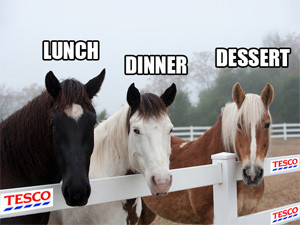The Internet has had a field day with the European horsemeat saga.
Plenty of puns, hashtag trends, photo-shopped images of jockeys riding boxes of frozen lasagne, and even a horsemeat song, have been doing the rounds and poking fun at the fact that thousands of consumers have unwittingly been munching animals they considered furry friends, rather than food.
The horsemeat saga has even reached "meme" status, and spawned an online horsemeat calculator, which concerned (or morbidly fascinated) consumers can use to find out exactly how many horses they are likely to consume in their lifetime, given their current intake of horse-infused lasagne and/or burgers.
Of course, some have shunned the puns and decried the irreverence much of the Internet is treating the issue with - lest we forget this is a matter of great importance for consumer rights and food safety/quality. If the meat industry can get away with disguising horse as beef, what other culinary horrors are they capable of? The mind boggles.
What a mare!
As much as the retailers and industry players in question have tried to shut the stable doors on this scandal, with apologies and assurances, thanks to social media, this is one horse that has bolted clean over the hills.

The scandal originated in Ireland, where traces of horsemeat were found in burgers labelled as "beef", sparking a call for the testing of all products along the food chain and in other regions - resulting in Britain, Poland, France, and even Burger King, being drawn into the fray.
While there's nothing about horsemeat itself that is any more dangerous to human health than beef or any other meat, for the British, in particular, it's the mere thought of eating a horse that is a great culinary taboo. The British pride themselves on being animal lovers - and horse lovers in particular - while in mainland Europe, horse is somewhat more common on the dinner table.
Social media is particularly good at holding up a mirror to society and forcing it to examine its shortcomings and double standards.
Interestingly, in the 18th century, French revolutionaries found the fallen aristocracy's horses to be a great source of sustenance - resulting in a horsemeat industry that continued for two centuries, before falling from grace with the majority of the population. The French are now said to consume just a fifth of the horsemeat they did 30 years ago.
What changed? Where did the moral sensibility that eating horse is more disturbing or "unsavoury" than eating a cow or a pig or a sheep come from?
From my perspective, this scandal has particularly shocked and disgusted Britons because the tenuous line that so many of us, not just the British, draw between animals that are loved and adored as pets and those that are destined for the dinner plate, has been blurred.
It's all rather awkward really. Especially since the entire scandal was not exposed because consumers actually noticed there was something different about their burgers and lasagnes, or because anyone was poisoned by the food.
The outrage and the disgust really just stems from the fact that people have been made acutely aware of their own hypocrisy. Social media is particularly good at holding up a mirror to society and forcing it to examine its shortcomings and double standards.
Fussy eaters
And my goodness, but we get a bit touchy about our food, don't we? Especially about our freedom to choose to eat specific animals and not others - and even specific parts of animals and not others.
As a vegetarian, it never fails to amuse me just how uncomfortable and defensive people become when their eating habits are called into question. At many a meal, I've had fellow diners wax lyrical about their love for animals, while tucking into their burger/steak/drumstick, completely oblivious to the irony.
If this is pointed out to them, there are the usual retorts: "But it's the natural order of things", "If I'm not supposed to eat it, why is it so delicious?" But, when asked if they would tuck into their family dog or cat if s/he were equally tasty, most people are repulsed by the very idea.
Another one of my favourite retorts from meat eaters is: "Well, I don't care where it comes from as long as it ends up on my plate" - words that are perhaps a bit more difficult to swallow when accompanied with a side of horse.
While it may be the stuff of pure urban legend, the recent images of chicken innards finding their way into family KFC buckets, which did the rounds on the social networks, also just made me wonder about the duplicity involved in only being comfortable with eating certain parts of an animal and not others.
Eat one part, eat them all. Eat one animal, eat them all. No?
Social media has done a great job of inadvertently poking fun at the food hypocrisy exposed by this scandal. From the images of My Little Pony squished into a hamburger patty to the mock adverts for "Black Beauty Burgers", the choice of humour rather than outrage speaks to the fact that there's just no point in getting on one's 'high horse' about an issue when one has no firm moral standing on it to begin with.
Share